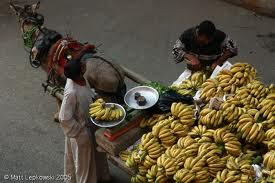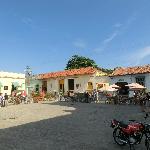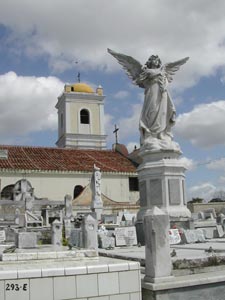 A story to me means a plot where there is some surprise. Because that is how life is – full of surprises.
A story to me means a plot where there is some surprise. Because that is how life is – full of surprises.
Isaac Bashevis Singer
Cecilia’s new friend Ánibal stopped in front of a small, black and white  building on Colón Street, no more than a five minute ride from the records office. He parked in the street, directly beneath the
building on Colón Street, no more than a five minute ride from the records office. He parked in the street, directly beneath the  Prohibido Apacar sign, jumped out and took her suitcase from the seat next to her. Cecilia slid over and got out on the sidewalk. She walked into a foyer, and it was like taking a step back in time. The reception counter was tucked into a niche, and just behind and to the left of it was a small dining area. Ánibal was speaking in animated, rapid Spanish to the man behind the counter. “Oye, this is my uncle Fernando – Fernando, please welcome my new friend, ah…?” Cecilia smiled slightly and said “Cecilia – Cecilia Vasquez. Mucho gusto.” She shook hands with “uncle” Fernando, and turned to Ánibal, not sure if Fernando spoke English. “Is this Tia Consuela’s husband?” “Oh, no,” replied Anibal. This is a brother of my mother. Consuela is the sister of my father!” Cecilia nodded, wondering how many more of Ánibal’s family members would she meet before this trip was over? Uncle Fernando spoke to Ánibal, who said to Cecilia “Fernando asks that you please sign the guest register. And that will be 800 Cuban pesos, or if you prefer American dollars, the price is discounted and it will be $28 for the room, dinner and breakfast before we leave tomorrow.” Cecilia handed Fernando two $20 bills. Fernando looked puzzled, and quickly spoke to Ánibal. “Fernando says he has no dollars to exchange, but he can give you pesos, is that OK? Cecilia replied, “please tell your uncle that he should keep the change.” This information was relayed to the uncle, who nodded vigorously with a broad smile. Cecilia thought to herself, “I bet they love American tourists here. And the exchange rate is certainly one I could get used to!”
Prohibido Apacar sign, jumped out and took her suitcase from the seat next to her. Cecilia slid over and got out on the sidewalk. She walked into a foyer, and it was like taking a step back in time. The reception counter was tucked into a niche, and just behind and to the left of it was a small dining area. Ánibal was speaking in animated, rapid Spanish to the man behind the counter. “Oye, this is my uncle Fernando – Fernando, please welcome my new friend, ah…?” Cecilia smiled slightly and said “Cecilia – Cecilia Vasquez. Mucho gusto.” She shook hands with “uncle” Fernando, and turned to Ánibal, not sure if Fernando spoke English. “Is this Tia Consuela’s husband?” “Oh, no,” replied Anibal. This is a brother of my mother. Consuela is the sister of my father!” Cecilia nodded, wondering how many more of Ánibal’s family members would she meet before this trip was over? Uncle Fernando spoke to Ánibal, who said to Cecilia “Fernando asks that you please sign the guest register. And that will be 800 Cuban pesos, or if you prefer American dollars, the price is discounted and it will be $28 for the room, dinner and breakfast before we leave tomorrow.” Cecilia handed Fernando two $20 bills. Fernando looked puzzled, and quickly spoke to Ánibal. “Fernando says he has no dollars to exchange, but he can give you pesos, is that OK? Cecilia replied, “please tell your uncle that he should keep the change.” This information was relayed to the uncle, who nodded vigorously with a broad smile. Cecilia thought to herself, “I bet they love American tourists here. And the exchange rate is certainly one I could get used to!”
A young  man about 15 came to carry her suitcase up the stairs. Cecilia turned to Ánibal, and said “Your cousin I presume?” Ánibal nodded – “that is my cousin Guillermo. He’s studying to be an engineer. We are very proud of him.” Cecilia began to follow Guillermo up the stairs. On the second step, she turned and asked Ánibal, “what time in the morning?” Hel ponder for a minute, and then said “I will pick you up here at 9 am. That should get us to Camaguey by 4 pm, if there isn’t too much traffic on the road.” Cecilia nodded and said “see you tomorrow. Adios.” With that, Ánibal turned, waved at Uncle Fernando and went back to the cab.
man about 15 came to carry her suitcase up the stairs. Cecilia turned to Ánibal, and said “Your cousin I presume?” Ánibal nodded – “that is my cousin Guillermo. He’s studying to be an engineer. We are very proud of him.” Cecilia began to follow Guillermo up the stairs. On the second step, she turned and asked Ánibal, “what time in the morning?” Hel ponder for a minute, and then said “I will pick you up here at 9 am. That should get us to Camaguey by 4 pm, if there isn’t too much traffic on the road.” Cecilia nodded and said “see you tomorrow. Adios.” With that, Ánibal turned, waved at Uncle Fernando and went back to the cab.
Cecilia had a decent night’s sleep, with the french doors facing the Malecon open to the sea breeze. Dinner the previous night was a light fare including freshly caught shrimp and a melange of local fruits and vegetables. She could identify fresh mango, and mamey sapote, but wasn’t too sure about the others. Of course, there were plenty of black beans and rice, never Cecilia’s favorite dish in Cuban cuisine. For dessert she had a delicious  flan made with goat’s milk, according to the bellboy-turned-waiter Guillermo, whose English was impeccable. Breakfast was Cuban coffee and home-made pastries, which Cecilia drank and ate with gusto. Promptly at 9, Ánibal was there. He took her suitcase and backpack, putting the suitcase in the trunk and the backpack on the seat beside her. She was impressed with his sensitivity to her concerns about her belongings. With no further discussion, other than a wave to Uncle Fernando sweeping the front porch, they were off.
flan made with goat’s milk, according to the bellboy-turned-waiter Guillermo, whose English was impeccable. Breakfast was Cuban coffee and home-made pastries, which Cecilia drank and ate with gusto. Promptly at 9, Ánibal was there. He took her suitcase and backpack, putting the suitcase in the trunk and the backpack on the seat beside her. She was impressed with his sensitivity to her concerns about her belongings. With no further discussion, other than a wave to Uncle Fernando sweeping the front porch, they were off.
The trip to Camaguey reminded Cecilia of the VCR tape her social studies teacher had shown the class in 7th grade: the one entitled Life in Old Cuba. Of course, included in the dialogue were comments disparaging Fidel and Communism, but the images were what stuck with her. Images like the  banana-laden donkey carts, old vehicles kept running goodness knows how, and the inevitable salsa music that prompted everyone on the street to begin spontaneously
banana-laden donkey carts, old vehicles kept running goodness knows how, and the inevitable salsa music that prompted everyone on the street to begin spontaneously  dancing. It appeared Cuba had changed little in the fifty plus years since the revolution. Cecilia mused to herself, “Maybe the US did Cuba a favor with that blockade – it is so beautiful and unspoiled here. Some day this will be a tourist paradise when someone rational takes over in Washington.”
dancing. It appeared Cuba had changed little in the fifty plus years since the revolution. Cecilia mused to herself, “Maybe the US did Cuba a favor with that blockade – it is so beautiful and unspoiled here. Some day this will be a tourist paradise when someone rational takes over in Washington.”
At about noon Ánibal stopped at a roadside cafe, and they got out for a meal of plantains, yellow rice and what appeared to be goat. “Is this cafe run by Uncle Ernesto?” Cecilia kiddingly asked Ánibal. He looked at her quizzically, saying “Who?” “Never mind,” Cecilia laughed and said “I was just pulling your leg.” Ánibal looked under the table and then back at Cecilia, completely baffled. “You didn’t touch my leg, miss – perhaps the sun is too warm for you today?” Cecilia just shook her head and thought “maybe I’d better just stick to simple phrases with Ánibal. His English is good, but I suppose I’ve become too ‘Americanized’ for us to communicate anything else.”
After lunch they continued on, reaching Camaguey at 3:45 in the afternoon. Ánibal drove straight to the Department of Records on Cisneros Street. He pulled the cab into a diagonal parking slot on the opposite side of the street. Cecilia grabbed her backpack and entered the building. To her immediate right was the same sign she’d seen in Havana, Certificado Nacimiento. She walked up to the counter, and a young lady was there to help her. She filled out the same form that  moustache man had given her, and returned it to the clerk. She walked over to a large set of metal filing cabinets, and looked in two different places. Within five minutes, she’d returned and once again handed back the form. “I am sorry, there is no record of Javier Vasquez having been born here on July 20, 1931. Cecilia sighed, and thought “I guess that only leaves the last option: the diocese office.” Cecilia asked the young lady “can you direct me to the Catholic diocese office? “Certainly,” the girl replied. It is just off San Martín – here, let me show you.” By this time, Ánibal must have sensed things weren’t going well, and he was standing next to her. The clerk produced a map, and spoke with him in Spanish. “Gracias, señorita,” Ánibal said, and motioned with his head for Cecilia to follow him back outside. They returned to the cab, and Ánibal told her “The diocese office is only five minutes from here – and she was nice enough to say she would telephone the priest and tell him to expect us.” Cecilia thought, “well, this is a little better customer service than I would have ever gotten from moustache man!” “Good,” Cecilia said, I hope they have what I’m looking for.”
moustache man had given her, and returned it to the clerk. She walked over to a large set of metal filing cabinets, and looked in two different places. Within five minutes, she’d returned and once again handed back the form. “I am sorry, there is no record of Javier Vasquez having been born here on July 20, 1931. Cecilia sighed, and thought “I guess that only leaves the last option: the diocese office.” Cecilia asked the young lady “can you direct me to the Catholic diocese office? “Certainly,” the girl replied. It is just off San Martín – here, let me show you.” By this time, Ánibal must have sensed things weren’t going well, and he was standing next to her. The clerk produced a map, and spoke with him in Spanish. “Gracias, señorita,” Ánibal said, and motioned with his head for Cecilia to follow him back outside. They returned to the cab, and Ánibal told her “The diocese office is only five minutes from here – and she was nice enough to say she would telephone the priest and tell him to expect us.” Cecilia thought, “well, this is a little better customer service than I would have ever gotten from moustache man!” “Good,” Cecilia said, I hope they have what I’m looking for.”
Five minutes later, they were in front of  Plaza San Juan de Dios, a large, flat building that housed the church, school, the diocese office and an area for local artists to show their wares to tourists. Ánibal stopped the cab, saying “I’m going to leave you for a few minutes. I want to visit Tia Consuela’s cousin and get some of her good pork stew to take home. I won’t be gone more than a half hour. Is that OK?” Cecilia said that was fine, and that she would be waiting for him when he returned. He drove away, and Cecilia and entered the office. As she stepped across the threshold, a
Plaza San Juan de Dios, a large, flat building that housed the church, school, the diocese office and an area for local artists to show their wares to tourists. Ánibal stopped the cab, saying “I’m going to leave you for a few minutes. I want to visit Tia Consuela’s cousin and get some of her good pork stew to take home. I won’t be gone more than a half hour. Is that OK?” Cecilia said that was fine, and that she would be waiting for him when he returned. He drove away, and Cecilia and entered the office. As she stepped across the threshold, a  young priest came around the desk to greet her. “Buenas tardes, señorita,” he said. “Buenas tardes, padre.” replied Cecilia. He said “I am Father Rodolfo, and I understand you are looking for some information regarding a relative?” Cecilia replied, “Yes, I need to get a copy of my grandfather’s birth certificate. He is gravely ill and wants to return to Cuba…” she was about to say “to die” but could not bring herself to utter those words. “Good, good, we in the church are always happy to welcome a member of our lost flock back.” He hesitated, cleared his throat a few times, and rubbed his hands together. “Well, tell me your grandfather’s name and date of birth here in Camaguey, and I will see if we have any of his records.” Cecilia provided the information, and the priest excused himself to go into the adjoining room filled with
young priest came around the desk to greet her. “Buenas tardes, señorita,” he said. “Buenas tardes, padre.” replied Cecilia. He said “I am Father Rodolfo, and I understand you are looking for some information regarding a relative?” Cecilia replied, “Yes, I need to get a copy of my grandfather’s birth certificate. He is gravely ill and wants to return to Cuba…” she was about to say “to die” but could not bring herself to utter those words. “Good, good, we in the church are always happy to welcome a member of our lost flock back.” He hesitated, cleared his throat a few times, and rubbed his hands together. “Well, tell me your grandfather’s name and date of birth here in Camaguey, and I will see if we have any of his records.” Cecilia provided the information, and the priest excused himself to go into the adjoining room filled with  filing cabinets and books. He was gone for about five minutes, and returned with what could only be described as a baffled look on his face. “I want to make sure I have this right: Javier Vasquez, born in Camaguey, Cuba, July 20, 1931. That is correct? Cecilia said, with excitement growing, have you found his information?” The priest replied, “I have found some information, but not of the nature you described. But I would like for you to accompany me on a short trip, so together we can affirm that my information is correct.” This surprised Cecilia, but she thought, “What more could happen to me on this trip? And besides, he’s a priest.” She started to think about the meaning of that phrase in terms of recent events, but mentally decided not to go there. “OK,” she said. “May we go now? The young man that brought me here from Havana will be back in a few moments, and I need to get back to Havana to catch a flight home tomorrow.” The priest nodded, stuck his head in the room on the opposite side of the office and softly told an older woman working in there that he would return shortly.
filing cabinets and books. He was gone for about five minutes, and returned with what could only be described as a baffled look on his face. “I want to make sure I have this right: Javier Vasquez, born in Camaguey, Cuba, July 20, 1931. That is correct? Cecilia said, with excitement growing, have you found his information?” The priest replied, “I have found some information, but not of the nature you described. But I would like for you to accompany me on a short trip, so together we can affirm that my information is correct.” This surprised Cecilia, but she thought, “What more could happen to me on this trip? And besides, he’s a priest.” She started to think about the meaning of that phrase in terms of recent events, but mentally decided not to go there. “OK,” she said. “May we go now? The young man that brought me here from Havana will be back in a few moments, and I need to get back to Havana to catch a flight home tomorrow.” The priest nodded, stuck his head in the room on the opposite side of the office and softly told an older woman working in there that he would return shortly.
Cecilia and the priest got into his battered vehicle, which appeared to be Russian-made. “What is this car?” Cecilia asked. The priest smiled, and said “It’s a  Trabant, left over from the Russian visit to Cuba in the 60’s…I’m lucky to have any kind of vehicle, and this suits me well.” With that, he ground the gears into first and it lurched into motion. The trip took just five minutes, and they entered the gates of a cemetary, the
Trabant, left over from the Russian visit to Cuba in the 60’s…I’m lucky to have any kind of vehicle, and this suits me well.” With that, he ground the gears into first and it lurched into motion. The trip took just five minutes, and they entered the gates of a cemetary, the  Cementario General de Camaguey. The priest drove up to an old and battered shed, and got out of the vehicle. He spoke briefly with an old man, and showed him the card he was holding. Cecilia gathered this was the groundskeeper of the cemetary. The caretaker took the card inside the shed, and returned in a couple of minutes with another card. He pointed to his left, waving further to the left. The priest returned, saying “We must get out and walk to the location I wish to show you.” Father Rodolfo opened Cecilia’s door. “Sometimes this door is hard to open from the inside – it’s a small thing, don’t you think?” Cecilia nodded, now growing apprehensive about their ultimate destination. The priest closed the car door and asked her to follow him. They went down several rows, turned left, then stopped on the right side of the walkway. He pointed at a grave marker. Cecilia looked at the granite slab, and immediately the image of
Cementario General de Camaguey. The priest drove up to an old and battered shed, and got out of the vehicle. He spoke briefly with an old man, and showed him the card he was holding. Cecilia gathered this was the groundskeeper of the cemetary. The caretaker took the card inside the shed, and returned in a couple of minutes with another card. He pointed to his left, waving further to the left. The priest returned, saying “We must get out and walk to the location I wish to show you.” Father Rodolfo opened Cecilia’s door. “Sometimes this door is hard to open from the inside – it’s a small thing, don’t you think?” Cecilia nodded, now growing apprehensive about their ultimate destination. The priest closed the car door and asked her to follow him. They went down several rows, turned left, then stopped on the right side of the walkway. He pointed at a grave marker. Cecilia looked at the granite slab, and immediately the image of  Ebenezer Scrooge jumped into her head. Ebeneezer was trembling as he saw what the Ghost of Christmas’ yet to come and his bony finger pointed to. Cecilia was trembling as well, as she saw clearly written in block letters on the stele: JAVIER VASQUEZ. Nacido 20 Julio, 1931, Muerto 9 Augusto, 1957.
Ebenezer Scrooge jumped into her head. Ebeneezer was trembling as he saw what the Ghost of Christmas’ yet to come and his bony finger pointed to. Cecilia was trembling as well, as she saw clearly written in block letters on the stele: JAVIER VASQUEZ. Nacido 20 Julio, 1931, Muerto 9 Augusto, 1957.
According to this tombstone, her grandfather had been dead for 57 years. Cecilia felt herself grow faint, but caught herself in time to sit down on the walkway. The priest looked at her with concern, “I am sorry to have to show you this, and I’m sure there must be some kind of mistake. This is the only record I have that somewhat matches your information. And no-one named Javier Vasquez was born in Camaguey on that day. Cecilia replied with a soft voice, “But that is impossible! I left my grandfather two days ago in Miami. He was unwell, but still very much alive.” The priest replied, “Listen, I’m sure there’s some confusion. I was not here back then – in fact, I was not even born yet. But the priest who served here for many years before me will know more about this. I’m sure of it. He is retired, but I will be happy to telephone him and tell him you need to see him. Would you like to do that?” Cecilia nodded. Finally, she thought “I’m not sure how much more of this I can take. I’ll talk with the priest, but after that, I’m going home. This adventure has contained just too many surprises for one woman to handle.”
